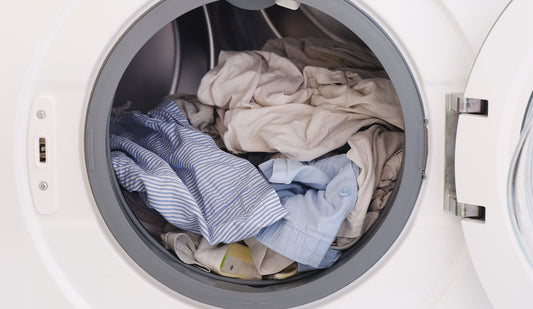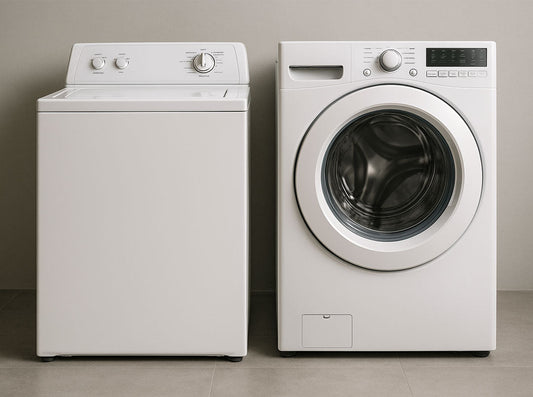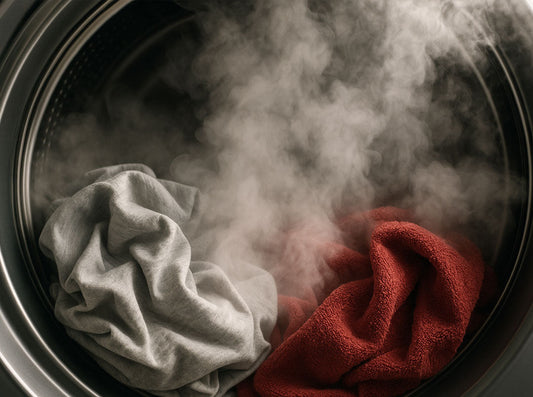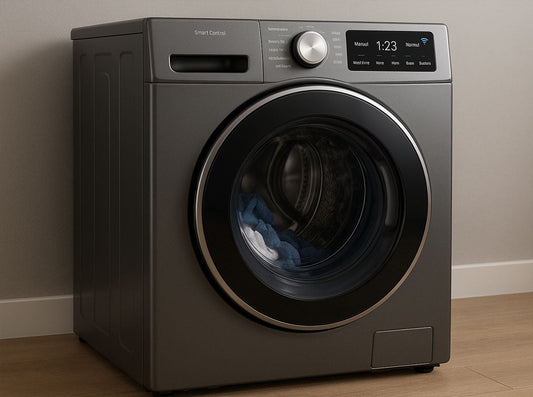On the complete list of small, ordinary things that make us feel accomplished during the day, a clean home and freshly washed laundry rank somewhere near the top. But what do we do when the things that are supposed to help us clean cause more skin irritation or allergies than the dirt itself?
Adverse skin reactions to laundry detergent are a frustrating reality for countless people—doubly so when you don't know which ingredient is to blame. Between the harsh synthetic fragrances, phthalates, chlorine, bleach, and other harsh chemicals often found in liquid laundry detergent, figuring out what's causing your reaction can seem impossible.
To help, we've put together a comprehensive breakdown of why laundry detergent allergies happen, the ingredients most likely to cause them, and how to eliminate them from your life once and for all.
How to Tell if You Have a Laundry Detergent Allergy
Skin irritation from soaps and detergents is unquestionably real, but how do you know if it's a genuine allergic reaction or something else? For most people, the truth is that allergic reactions to detergents are relatively rare, affecting only about 1% of individuals.
Instead, the vast majority of people who react negatively to laundry detergents experience what's known as irritant contact dermatitis, a condition that can cause rashes or skin damage and can even spread to other parts of your body.
While most people mistakenly believe that both allergic contact dermatitis and irritant contact dermatitis share almost identical symptoms, the truth is that the two conditions have key differences that you can use to determine which you're experiencing.
Common Symptoms of a Detergent Allergy
Like most other true allergies, detergent allergies typically develop in specific ways, including what's called "sensitization," where a person gradually develops a worsening allergic reaction to a certain trigger.
During this process, your body develops special proteins to try and protect against a substance, but in doing so, can cause nasty symptoms, such as:
- Itchy rash or lesions
- Small, clear, fluid-filled blisters
- Symptoms can be acute, subacute, or chronic
- Unclear borders between healthy and irritated skin
Also, remember that a detergent allergy will usually worsen with each repeated exposure and take longer to resolve—a key component of allergic reactions in general.
Symptoms of Irritant Contact Dermatitis
When trying to explain irritant contact dermatitis, the key term to keep in mind is "chemical," as in "chemical burn." While usually less severe than the image that term brings to mind, the cause behind detergent-induced irritant contact dermatitis is similar.
Unlike an allergic reaction, the symptoms of contact dermatitis caused by irritants have less to do with proteins produced by your body and more with cell damage caused by exposure to certain substances. According to the National Eczema Association, this type of contact dermatitis accounts for around 80% of all cases.
Common symptoms of irritant contact dermatitis include:
- Sudden onset of pain or inflammation
- Occurs after a single exposure
- Swelling and reddened skin
- Skin fissuring or thickening with repeated exposure
- Clearly defined area of irritation
Although irritant contact dermatitis is most obvious when it occurs in a single, more severe reaction to a product, it can also develop over time with repeated exposure to lower amounts of the same product.
What Causes Laundry Detergent Allergies?
Regardless of whether you use liquid detergent, pods, or detergent sheets, the ingredients to watch out for are mostly the same and fall into four main categories.
Artificial Fragrances
During our research, we found that many people who struggled with detergent-related skin irritation had special difficulties with artificial fragrances. This is due to detergent companies' use of proprietary blends for their scents, the ingredients of which aren't always disclosed to consumers.
Because of the secretive nature of these blends, users may react to just one ingredient but find themselves completely incapable of figuring out which ingredient is to blame.
Additionally, many artificial fragrances use phthalates—which have been shown to disrupt the body's hormone balance—and known carcinogens, such as styrene.
This means that even if you or your family don't have strong adverse reactions to artificial fragrances, you may still want to opt for fragrance-free soap and detergent for your home.
Fabric Softeners
While they may have been more popular in years past, trends show that fabric softeners have fallen out of favor with modern generations. And although this could be for any number of reasons, it's safe to say that the potential skin irritation experienced when using these products has contributed to their decline.
But what is it about fabric softeners that causes some people to suffer adverse reactions? Some studies point to a common fabric softener ingredient known as "quaternary ammonium compounds" or "quats." Prolonged exposure to these compounds, which play a crucial role in fabric softener's ability to leave your clothes silky and soft, has also been linked to contact dermatitis and an increased risk of asthma.
Luckily, you don't have to sacrifice cleaning power or softness when washing clothes. Instead of relying on fabric softener, try looking for simple, straightforward detergents that use natural ingredients to keep your fabrics clean.
Preservatives
Though we landed on "preservatives" for this section, we could have just as easily named it "parabens," the main word you should watch for when choosing between detergents. Ironically, parabens have been used as a preservative in cosmetics and other hygiene products for over a century to fend off fungus, yeast, bacteria, and other nasty substances.
Today, research into parabens is ongoing, but an increasing number of studies link the chemical to worrying side effects like hormone disruption, impaired reproductive development, and decreased fertility. Experts believe that these effects may come from parabens' ability to behave like estrogen in the body, which in turn changes the way your body produces its natural supply of hormones.
Additionally, some detergents may use different, non-paraben preservatives, such as MIT or CMIT. While reactions to these compounds may be less common than with others, those with especially delicate skin may want to opt for detergents that avoid synthetic preservatives altogether.
Dyes
It's likely that you've started seeing the rise of clear laundry detergent while shopping—and that's not just because people are tired of the neon-blue, goopy mess of traditional laundry detergents. Many dyes and colorants, like those used in big-name laundry detergents, may trigger rashes or irritation in those with sensitive skin.
Today, the vast majority of detergent brands have begun pivoting away from dyes and artificial coloring in their products, so it's less of a hassle to find a detergent that works for your clothes and skin. That said, brands that prioritize a hypoallergenic formula in ways other than removing dyes are typically safest.
How to Prevent Laundry-Related Allergic Reactions
Useful though it may be to understand the "what" and "why" of detergent-related skin irritation, most people are more interested in how to stop it—and for good reason. If you're experiencing what you think to be a detergent allergy or irritant contact dermatitis, there are a few steps you can take to find answers.
Avoid Harsh Chemicals
Before you get into the nitty-gritty of researching specific ingredients, one of the first things all detergent users should do is toss out products containing harsh chemicals, such as phthalates, parabens, and bleaches.
Even if these chemicals aren't the cause of your specific reaction, they still should have no place in your home, on your skin, or polluting the environment, especially when so many safe, natural detergents exist on the market.
Eliminate One Product at a Time
If you're struggling with skin irritation or a suspected allergic reaction, your first instinct may be to toss out all of your household cleaning products and start from scratch—an impulse we completely understand. The tricky thing about identifying the true culprit behind your skin irritation, however, is that you have to eliminate variables one at a time.
By slowly and methodically removing one product at a time, seeing whether your skin issues clear up, and then moving to the next, you can figure out exactly what it is you're reacting to. That way, you can steer clear of future products containing that ingredient. While this may be less satisfying than simply starting fresh, it gives you the knowledge and facts you need to be safer in the long run.
Try Hypoallergenic Laundry Detergent
Many brands—even the big ones—are waking up to how much their customers care about skin health. Because of this growing appreciation, many detergent brands have begun offering hypoallergenic products designed with delicate complexions in mind.
Meet with Your Doctor
In situations where you've seemingly tried everything and are still suffering from skin issues, meeting with your doctor may be warranted. There, the two of you can talk about your day-to-day risk factors, discuss medications, and even perform an allergen test to determine once and for all whether you're suffering from an allergic reaction or something else.
HeySunday Detergent Sheets: The Best Option for Sensitive Skin
Whether you're experiencing issues with your current detergent or simply want an all-around safer, healthier detergent for you and your family, HeySunday's laundry sheets combine all the most important qualities of the best hypoallergenic detergents.
With only plant-based surfactants, zero phthalates, dyes, or parabens, and a scent-free option for those who want to avoid fragrances altogether, our formula was built from the ground up to work with even the most delicate complexions.
And, unlike other skin-safe detergents that struggle to get your clothes truly clean, we invested the time, effort, and research needed to design a product that's as tough on dirt as it is gentle on your skin. We're so confident in our ability to walk this line, in fact, that we offer a 100% money-back guarantee on every order of HeySunday detergent sheets.
So, if you're ready to ditch the itch and swap to a detergent that cares about the health of your family and your fabrics, consider trying HeySunday today.







